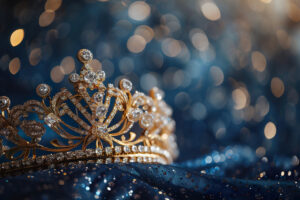 Two weeks removed from a Halloween that inspired thousands of people to dress as reality television’s Honey Boo Boo, child beauty pageants have again entered the national consciousness. From small festival- and fair-based competitions to elaborate, expensive, national endeavors, child beauty pageants are a $5 billion industry. Parents who enroll their children in such pageants fiercely defend them as the child’s choice, and many participants—particularly on pageant-centered shows such as TLC’s Toddlers & Tiaras—seem thrilled to be involved. But what effects do beauty pageants have on children and their impressionable minds?
Two weeks removed from a Halloween that inspired thousands of people to dress as reality television’s Honey Boo Boo, child beauty pageants have again entered the national consciousness. From small festival- and fair-based competitions to elaborate, expensive, national endeavors, child beauty pageants are a $5 billion industry. Parents who enroll their children in such pageants fiercely defend them as the child’s choice, and many participants—particularly on pageant-centered shows such as TLC’s Toddlers & Tiaras—seem thrilled to be involved. But what effects do beauty pageants have on children and their impressionable minds?
Why Children Enter Beauty Pageants
Children are the masters of fantastical ideas, so it’s no wonder that many girls involved in the pageant circuits relish spending a few days a year as Cinderella. But children can’t enter pageants without their parents’ blessing, so involvement ultimately hinges on parental choice rather than the child’s. In a new paper published in the Journal of the American Academy of Child and Adolescent Psychiatry, University of Arizona professor Martina M. Cartwright emphasizes this point. She calls the phenomenon “princess by proxy,” explaining that the real attraction of pageants is for parents who can gain social status, self-esteem, and money when their children participate.
Potential Effects of Beauty Pageants: Eating Disorders and Body-Image Distortion
Pageants, particularly those designed for younger children, focus primarily on appearance, attire, and perceived “cuteness.” Talent competitions occur in some pageants and often are a secondary component of the experience. Thus, pageants suggest to young children that there is value in focusing on their appearance as judged through the eyes of others. This can lead to significant body-image distortions, and adults who once participated in child beauty pageants may experience low self-esteem and poor body image.
As with most adult pageants, child pageants often require crash dieting. Parents may encourage children to quickly lose weight so they can fit into small costumes or display tiny bodies in swimsuit-centered fitness competitions. Some parents put their kids on crash diets designed to help them gain energy and enthusiasm. These diets may consist solely of sugary snacks and sports drinks for several days. This can harm both short- and long-term health and teaches children unhealthy approaches to food that can contribute to the development of eating disorders.
Beauty Pageants and the Sexualization of Young Girls
Sexualization is the tendency to view oneself as a sex object, and children who participate in beauty pageants are sexualized very early. Children may dress in highly suggestive costumes and learn that they gain attention and status when sexualized. This may lead to premature sexual activity and can teach the unfortunate lesson that women’s worth is determined at least in part by their status as sex objects.
The Unhealthy Values Built by Beauty Contests
While some pageants are brief events that require little preparation, the world of pageants can be cutthroat and extremely competitive. Children learn a host of unhealthy values, including the desire to defeat their competition at all costs. Tantrums and meltdowns—by children and parents alike—are common backstage at beauty pageants, and long-term participation in pageants can teach children that their primary source of worth is how many pageants they win and how “beautiful” they are perceived to be. Academic achievement, empathy, social skills, athletic pursuits, and other age-appropriate activities may take a backseat in the world of pageants. And because precious few pageant participants grow up to become models or entertainers, this early experience can stunt their development by focusing their attention on something they are unlikely to be able to do as adults.
References:
- Giroux, H. A. (2009, May 11). Child beauty pageants: A scene from the “other America.” Truthout. Retrieved from http://archive.truthout.org/051109A
- Sinpetru, L. (n.d.). Child beauty pageants foster adult body dissatisfaction, eating disorders. Softpedia. Retrieved from http://news.softpedia.com/news/Child-Beauty-Pageants-Foster-Adult-Body-Dissatisfaction-Eating-Disorders-302540.shtml

The preceding article was solely written by the author named above. Any views and opinions expressed are not necessarily shared by GoodTherapy.org. Questions or concerns about the preceding article can be directed to the author or posted as a comment below.


 What Is Body Image?
What Is Body Image? Am I Ugly or Am I Pretty?
Am I Ugly or Am I Pretty? When Children Reject, Disrespect, and Disappoint
When Children Reject, Disrespect, and Disappoint

Please fill out all required fields to submit your message.
Invalid Email Address.
Please confirm that you are human.
Leave a Comment
By commenting you acknowledge acceptance of GoodTherapy.org's Terms and Conditions of Use.